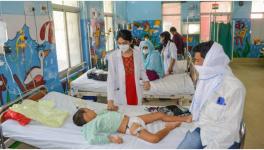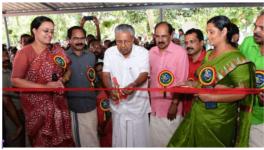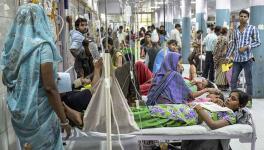Health Workers in South Korea Prepare for Nationwide Strike

A rally by Korean health workers. Photo: Korean Health and Medical Workers' Union
The Korean Health and Medical Workers’ Union (KHMU) has announced a nationwide strike starting Thursday, July 13, unless the government responds to their demands. The trade union has been concerned about staff shortages and low wages for years and is now prepared to escalate action as President Yoon Seok-yeol’s administration continues to ignore the issues faced by health workers.
In a recent press release, the KHMU emphasized that the strike aims to defend the lives and health of the people, in collaboration with citizens. Trade union officials also stated that during the strike, they would address the existing problems in the healthcare system, emphasizing the danger of a collapse in essential and public healthcare due to a lack of health workers.
KHMU has listed seven demands for the government to address. Among these, the most prominent are expanding the nursing and medical force and ensuring fair compensation for health workers who have risked their lives during the COVID-19 pandemic. Additionally, the trade union is demanding the formalization of a 1:5 nurse-to-patient ratio and a concrete plan of work for the health institutions that were previously used as COVID-19 centers.
If an agreement is not reached before Thursday, health workers will embark on their first strike since 2004 when they took action to obtain a 5-workday week. The anticipated industrial action enjoys widespread support from the membership, with 92% of the balloted members declaring themselves in favor of striking. KHMU expects approximately 45,000 health workers in 145 workplaces to join the strike.
The widespread support does not come as a surprise, considering the data collected and published by KHMU earlier this year. According to the trade union’s yearly workplace survey, more than 80% of nurses under the age of 30 considered a career change during the past year. Their discomfort stems from the high work intensity and low income levels. The survey revealed that one-third of the nurses worked overtime, resulting in 22% of them skipping meals an average of four times a week. When the survey results were published, KHMU stated, “Nurses working in healthcare settings are experiencing high labor intensity to the extent that they don’t even have time for meals, and long working hours are prevalent.”
The first two days of the health workers’ strike will overlap with the conclusion of a two-week-long general strike organized by the Korean Confederation of Trade Unions (KCTU) since the beginning of July. Breaking from tradition, the trade unions’ umbrella organization launched the strike not only to secure better working conditions in a specific branch of the industry or warn against a particular employer’s bad practices but also to call for an end to the anti-labor, pro-business policies implemented since the conservative Yoon Seok-yeol was elected in 2022.
As the general strike unfolded, KCTU officials called for the ouster of Yoon Seok-yeol, stating that his government’s policies have normalized bad working and living conditions for most people. Beginning with his election-time promises to reduce the minimum wage and increase working hours thresholds, Yoon has been dedicated to promoting the benefits of business over those of workers, including issuing back-to-work orders and adopting a zero-tolerance policy towards large-scale strikes.
“The president is using the authority given by the people to oppress workers and destroy livelihoods, democracy and peace,” pointed out a KCTU official during the press conference when the general strike was launched.
People’s Health Dispatch is a fortnightly bulletin published by the People’s Health Movement and Peoples Dispatch. For more articles and to subscribe to People’s Health Dispatch, click here.
Get the latest reports & analysis with people's perspective on Protests, movements & deep analytical videos, discussions of the current affairs in your Telegram app. Subscribe to NewsClick's Telegram channel & get Real-Time updates on stories, as they get published on our website.
























